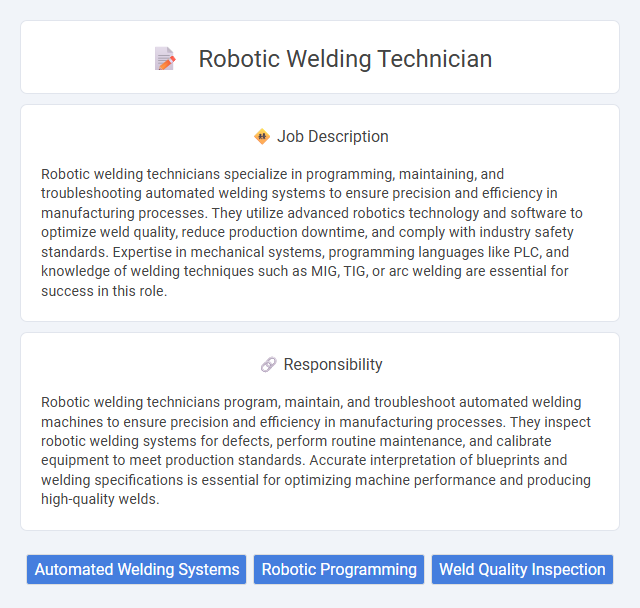
Robotic welding technicians specialize in programming, maintaining, and troubleshooting automated welding systems to ensure precision and efficiency in manufacturing processes. They utilize advanced robotics technology and software to optimize weld quality, reduce production downtime, and comply with industry safety standards. Expertise in mechanical systems, programming languages like PLC, and knowledge of welding techniques such as MIG, TIG, or arc welding are essential for success in this role.
Individuals with strong technical skills and an interest in robotics are likely to excel as robotic welding technicians. People who can work carefully in demanding environments and handle repetitive tasks might find this job suitable. However, those who struggle with precision or have difficulty standing for long periods may face challenges in this role.
Qualification
Robotic welding technicians require specialized training in welding technology, robotics programming, and automated systems maintenance. Certification from recognized bodies such as the American Welding Society (AWS) enhances job prospects and validates proficiency in welding techniques and robotic controls. Strong technical skills in diagnosing mechanical issues and knowledge of safety protocols are essential for success in this high-demand field.
Responsibility
Robotic welding technicians program, maintain, and troubleshoot automated welding machines to ensure precision and efficiency in manufacturing processes. They inspect robotic welding systems for defects, perform routine maintenance, and calibrate equipment to meet production standards. Accurate interpretation of blueprints and welding specifications is essential for optimizing machine performance and producing high-quality welds.
Benefit
Robotic welding technician roles likely offer significant benefits such as higher precision in welds, reducing material waste and improving product quality. These positions may also provide opportunities for career growth in automation and advanced manufacturing sectors. Job stability could be probable due to increasing reliance on robotic systems in industrial production.
Challenge
Robotic welding technician roles likely involve complex problem-solving challenges as they work with advanced automated welding systems. They probably face the challenge of troubleshooting and programming robots to ensure precision and efficiency in welding tasks. Continuous learning may be necessary to adapt to evolving technologies and maintain system performance.
Career Advancement
Robotic welding technicians can advance their careers by gaining expertise in programming, troubleshooting, and maintaining sophisticated robotic systems used in manufacturing. Mastery of advanced automation technologies and certifications in robotics welding software significantly enhance job prospects and earning potential. Opportunities for career growth include roles such as robotics engineer, automation specialist, and production supervisor in industries like automotive, aerospace, and heavy machinery manufacturing.
Key Terms
Automated Welding Systems
Robotic welding technicians specialize in programming, operating, and maintaining automated welding systems to enhance precision and efficiency in manufacturing processes. Expertise in robotic arm calibration, sensor integration, and troubleshooting software malfunctions is essential for optimizing weld quality and reducing downtime. Proficiency with industry-standard robotics platforms such as Fanuc, ABB, and KUKA significantly improves system performance and production scalability.
Robotic Programming
Robotic welding technicians specialize in programming automated welding systems to enhance precision and efficiency in manufacturing processes. They develop, test, and troubleshoot robotic welding programs using software like FANUC, ABB, or KUKA to ensure optimal performance and adherence to quality standards. Expertise in robotic programming languages, sensor integration, and welding parameters is essential for maintaining production consistency and reducing downtime.
Weld Quality Inspection
Robotic welding technicians specialize in programming and maintaining automated welding systems to ensure precise and consistent welds. Their expertise in weld quality inspection involves using advanced sensors and imaging technology to detect defects such as cracks, porosity, and incomplete fusion. Accurate quality assessment enhances structural integrity and reduces rework costs in manufacturing and construction industries.
 kuljobs.com
kuljobs.com